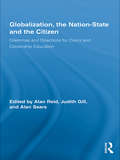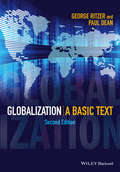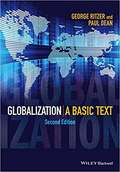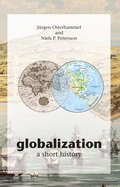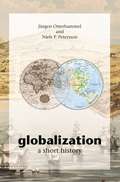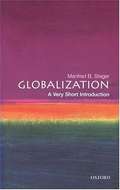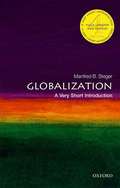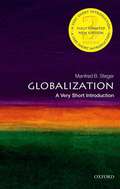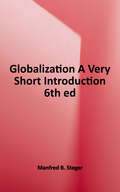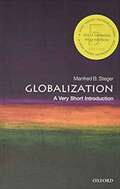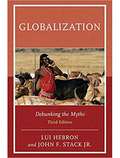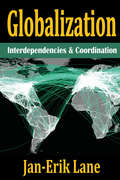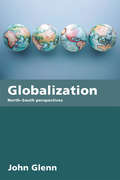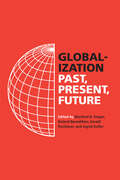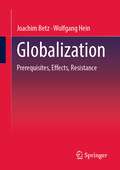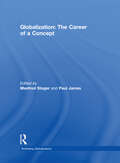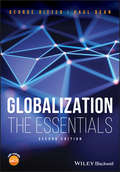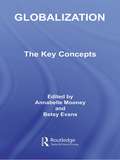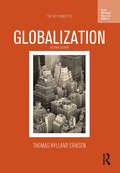- Table View
- List View
Globalization, the Nation-State and the Citizen: Dilemmas and Directions for Civics and Citizenship Education (Routledge Research in Education)
by Alan ReidThe past decade has seen an explosion of interest in civics and citizenship education. There have been unprecedented developments in citizenship education taking place in schools, adult education centers, or in the less formally structured spaces of media images and commentary around the world. This book provides an overview of the development of civics and citizenship education policy across a range of nation states. The contributors, all widely respected scholars in the field of civics and citizenship education, provide a thorough understanding of the different ways in which citizenship has been taken up by educators, governments and the wider public. Citizenship is never a single given, unproblematic concept, but rather its meanings have to be worked through and developed in terms of the particularities of socio-political location and history. This volume promotes a wider and more grounded understanding of the ways in which citizenship education is enacted across different nation states in order to develop education for active and participatory citizenry in both local and global contexts.
Globalization: A Basic Text
by George Ritzer Paul DeanUpdated to reflect recent global developments, the second edition of Globalization: A Basic Text presents an up-to-date introduction to major trends and topics relating to globalization studies. Features updates and revisions in its accessible introduction to key theories and major topics in globalization Includes an enhanced emphasis on issues relating to global governance, emerging technology, global flows of people, human trafficking, global justice movements, and global environmental sustainability Utilizes a unique set of metaphors to introduce and explain the highly complex nature of globalization in an engaging and understandable manner Offers an interdisciplinary approach to globalization by drawing from fields that include sociology, global political economy, political science, international relations, geography, and anthropology Written by an internationally recognized and experienced author team
Globalization: A Basic Text
by George Ritzer Paul DeanAn accessible and comprehensive introduction to key concepts in globalization written by leading authors in the field In the comprehensively revised Third Edition of Globalization: A Basic Text, distinguished researchers and authors George Ritzer and Paul Dean deliver an up-to-date introduction to major trends and topics related to the study of globalization. The book includes accessible and rigorous material on the key theories and major topics in globalization, as well as modern developments like the rise of populism and far-right political groups, Brexit, migration and backlash to it, trade negotiations, social media and the spread of misinformation, climate change, social justice issues, and COVID-19. The new edition includes a greater focus on the structures of inequality that encourage or discourage global flows. Additionally, new examples and sources from Central and South America, Africa, and Asia are used to illustrate key concepts, and round out the international coverage of book. Throughout, the authors use clear and helpful metaphors including solids, liquids, gases, and flows to introduce and explain the complex nature of globalization in an engaging and understandable way. Readers will also benefit from the inclusion of: A thorough introduction to globalization and related processes, including imperialism, colonialism, development, and westernization An exploration of neoliberalism, including its roots, principles, criticisms, and Neo-Marxist alternatives A practical discussion of global political structures and processes, as well as global economic flows of production and consumption A concise treatment of negative global flows and processes, including dangerous imports, diseases, crime, terrorism, and war Analysis of the changing nature of globalization and de-globalization, and the social movements and technological developments driving these changes More images, charts, and graphs to help illustrate and highlight the concepts contained in the book Perfect for advanced undergraduates studying globalization across sociology, political science, geography, anthropology, and economics, Globalization: A Basic Text, Third Edition will also be essential reading for students taking courses in culture, economy and inequality, and migration taught from a global perspective.
Globalization: A Basic Text, Second Edition
by George Ritzer Paul DeanUpdated to reflect recent global developments, the second edition of Globalization: A Basic Text presents an up-to-date introduction to major trends and topics relating to globalization studies.
Globalization: A Reference Handbook
by Justin Ervin Zachary A. SmithThe authors (a professor of and a PhD candidate in political science at Northern Arizona U.) present an introduction to the concept of globalization that includes the perspectives of neoliberals, institutionalists, and critics. It opens with an essay discussing definitional issues and the history of globalization, followed by a discussion of controversies associated with issues of technology, culture, the global economy, environmental problems, and national security, with each addressed from the three different perspectives mentioned above. The next chapter discusses the role the United States plays in the globalization process, particularly as it relates to the global economy, the environment, and global security. As with other volumes of the series, the volume includes a chronology of events, biographical profiles of significant individuals (including theorists and activists), select data and documents, a directory of organizations involved in or studying globalization, and an annotated list of print and nonprint resources.
Globalization: A Short History
by Niels P. Petersson Jürgen Osterhammel Dona Geyer"Globalization" has become a popular buzzword for explaining today's world. The expression achieved terminological stardom in the 1990s and was soon embraced by the general public and integrated into numerous languages. But is this much-discussed phenomenon really an invention of modern times? In this work, Jürgen Osterhammel and Niels Petersson make the case that globalization is not so new, after all. Arguing that the world did not turn "global" overnight, the book traces the emergence of globalization over the past seven or eight centuries. In fact, the authors write, the phenomenon can be traced back to early modern large-scale trading, for example, the silk trade between China and the Mediterranean region, the shipping routes between the Arabian Peninsula and India, and the more frequently traveled caravan routes of the Near East and North Africa--all conduits for people, goods, coins, artwork, and ideas.
Globalization: A Short History
by Niels P. Petersson Jürgen Osterhammel"Globalization" has become a popular buzzword for explaining today's world. The expression achieved terminological stardom in the 1990s and was soon embraced by the general public and integrated into numerous languages. But is this much-discussed phenomenon really an invention of modern times? In this work, Jürgen Osterhammel and Niels Petersson make the case that globalization is not so new, after all. Arguing that the world did not turn "global" overnight, the book traces the emergence of globalization over the past seven or eight centuries. In fact, the authors write, the phenomenon can be traced back to early modern large-scale trading, for example, the silk trade between China and the Mediterranean region, the shipping routes between the Arabian Peninsula and India, and the more frequently traveled caravan routes of the Near East and North Africa--all conduits for people, goods, coins, artwork, and ideas. Osterhammel and Petersson argue that the period from 1750 to 1880--an era characterized by the development of free trade and the long-distance impact of the industrial revolution--represented an important phase in the globalization phenomenon. Moreover, they demonstrate how globalization in the mid-twentieth century opened up the prospect of global destruction though nuclear war and ecological catastrophe. In the end, the authors write, today's globalization is part of a long-running transformation and has not ushered in a "global age" radically different from anything that came before. This book will appeal to historians, economists, and anyone in the social sciences who is interested in the historical emergence of globalization.
Globalization: A Very Short Introduction
by Manfred B. Steger"Globalization" has become the buzz-word of our time. A growing number of scholars and political activists have invoked the term to describe a variety of changing economic, political, cultural, ideological, and environmental processes that are alleged to have accelerated in the last few decades. Rather than forcing such a complex social phenomenon into a single conceptual framework, Manfred Steger presents globalization in plain, readable English as a multifaceted process encompassing global, regional, and local aspects of social life. In addition to explaining the various dimensions of globalization, the author explores whether globalization should be considered a "good" or "bad" thing--a question that has been hotly debated in classrooms, boardrooms, and on the streets.
Globalization: A Very Short Introduction (Fourth Edition)
by Manfred B. Steger"Globalization" has become one of the defining buzzwords of our time - a term that describes a variety of accelerating economic, political, cultural, ideological, and environmental processes that are rapidly altering our experience of the world. It is by its nature a dynamic topic. This Very Short Introduction has been fully updated for a fourth edition, to include recent developments in global politics, the global economy, and environmental issues. Presenting globalization as a multifaceted process encompassing global, regional, and local aspects of social life, Manfred B. Steger looks at its causes and effects, examines whether it is a new phenomenon, and explores the question of whether, ultimately, globalization is a good or a bad thing. In this fourth edition Steger discusses some of the key features of recent years, such as the EU fiscal crisis, the rise of robot technology and new war technology with civilian usage such as drones, the Ebola epidemic in West Africa, and new identity discussions around gender fluidity and sex change in the media. ABOUT THE SERIES: The Very Short Introductions series from Oxford University Press contains hundreds of titles in almost every subject area. These pocket-sized books are the perfect way to get ahead in a new subject quickly. Our expert authors combine facts, analysis, perspective, new ideas, andenthusiasm to make interesting and challenging topics highly readable.
Globalization: A Very Short Introduction (Third Edition)
by Manfred Steger'Globalization' has become one of the defining buzzwords of our time - a term that describes a variety of accelerating economic, political, cultural, ideological, and environmental processes that are rapidly altering our experience of the world. It is by its nature a dynamic topic - and thisVery Short Introduction has been fully updated for a third edition, to include recent developments in global politics, the global economy, and environmental issues. Presenting globalization in accessible language as a multifaceted process encompassing global, regional, and local aspects of social life, Manfred B. Steger looks at its causes and effects, examines whether it is a new phenomenon, and explores the question of whether, ultimately, globalization is agood or a bad thing.
Globalization: A Very Short Introduction (Very Short Introductions Ser.)
by Manfred B. StegerVery Short Introductions: Brilliant, Sharp, Inspiring We live today in an interconnected world in which ordinary people can become instant online celebrities to millions of fans thousands of miles away, in which religious leaders can influence billions globally, in which humans are altering the climate and environment, in which new infectious diseases spread across continents at lightning speed, and in which complex social forces are increasingly impacted by digital technology. This is globalization. In the sixth edition of his bestselling Very Short Introduction, Manfred B. Steger offers concise definitions of pertinent key terms and concepts. He provides an accessible overview of the long history of globalization followed by an examination of its major dimensions: economic, political, cultural, ideological, and ecological. He also engages the hotly contested question of whether it is, ultimately, a good or a bad thing. From climate change to the COVID-19 pandemic, resurgent nationalism to global social media, trade wars to China's growing global profile, Russia's expansionism to renewed fears of nuclear conflicts, he explores today's unprecedented levels of planetary integration and disruption. About The Series: The Very Short Introductions series from Oxford University Press contains hundreds of titles in almost every subject area. These pocket-sized books are the perfect way to get ahead in a new subject quickly. Our expert authors combine facts, analysis, perspective, new ideas, and enthusiasm to make interesting and challenging topics highly readable.
Globalization: A Very Short Introduction (Very Short Introductions Series)
by Manfred B. StegerWe live today in an interconnected world in which ordinary people can became instant online celebrities to fans thousands of miles away, in which religious leaders can influence millions globally, in which humans are altering the climate and environment, and in which complex social forces intersect across continents. This is globalization. <p><p> In the fifth edition of his bestselling Very Short Introduction Manfred B. Steger considers the major dimensions of globalization: economic, political, cultural, ideological, and ecological. He looks at its causes and effects, and engages with the hotly contested question of whether globalization is, ultimately, a good or a bad thing. From climate change to the Ebola virus, Donald Trump to Twitter, trade wars to China's growing global profile, Steger explores today's unprecedented levels of planetary integration as well as the recent challenges posed by resurgent national populism. <p><p> ABOUT THE SERIES: <p>The Very Short Introductions series from Oxford University Press contains hundreds of titles in almost every subject area. These pocket-sized books are the perfect way to get ahead in a new subject quickly. Our expert authors combine facts, analysis, perspective, new ideas, and enthusiasm to make interesting and challenging topics highly readable.
Globalization: Buying and selling the world (No-Nonsense Guides #37)
by Wayne EllwoodGlobalization has an ever-increasing effect on our lives. It has made the world smaller and brought us closer together yet it can also make us more vulnerable and divided. The deregulation of finance and banking and the crisis they led to is a devastating example of the knock-on effects of globalization. This fully revised fourth edition reviews the history and complexities of globalization, examining the forces in play and whose interests they serve. And while the global exchange of people, products, plants, animals, technologies, and ideas intensifies the key question that Wayne Ellwood asks ‘how can globalization be a positive force for change?’
Globalization: Causes And Effects (The Library of Essays in International Relations)
by David A. DeeseGlobalization: Causes and Effects is the culmination of an eleven volume series that defines and explains the scholarly field of International Relations. Highlighting primary scholarly accomplishments in the field, this final title frames the sub-field of 'Globalization' and documents the fundamental milestones in thinking about and understanding this phenomenon. 'Globalization' is ripe for work integrating a wide range of leading research results and assessing its findings as a whole. Together, the pioneering articles selected for this book represent the most important scholarly contributions published to date on the main dimensions of globalization. The majority of the authors are political scientists, but a substantial number are economists, sociologists and historians. The volume covers Forms, Origins, and Causes; Political Dimensions and Implications; Economic and financial Impacts; Identity, Culture, and Civilization; and The Future of Globalization.
Globalization: Debunking The Myths
by Lui Hebron John F. Stack Jr.Now in a fully revised and updated edition, this balanced and clearly written text explores globalization and its impact from economic, political, social, environmental, and cultural perspectives. Providing a framework and platform for student learning, the book gives readers the tools to unravel the complexities of globalization in all its facets. Lui Hebron and John Stack note that as a hot-button term, globalization is used to describe any number of changes within, among, and between societies and states. Their goal is to reduce the noise engulfing debates and interpretations of one of the most dynamic, contested, applauded, and disparaged phenomena of the twenty-first century. Arguing that current assessments—both positive and negative—of globalization are overblown, the authors treat the dramatically changing landscapes of world politics as less a revolution than an evolution of already established structures and patterns of transnational relations. They trace how globalization has affected individuals, societies, states, and intergovernmental and supranational organizations. Making sense of a world seemingly smaller and incomprehensibly larger, simultaneously centralizing and fragmenting, Globalization: Debunking the Myths offers both an indispensable introduction for undergraduates and a concise review for more advanced students.
Globalization: Interdependencies and Coordination
by Hugh DaunceyEfforts at coordination between nations are at the heart of the challenges of globalization. Despite steadily growing interdependencies, individual nations still have specific interests that present obstacles to globalization. While some challenges inspired by the need to coordinate are viewed as inevitable by many, they are less optimistic about prospects for success. Jan-Erik Lane argues that one should focus objectively upon the possibility of failures.Lane analyzes four kinds of challenges to interdependency, all of which are growing in geopolitical relevance. First, countries need to diminish their dependency on fossil fuel and shift to a reliable supply of energy, because fossil fuels are diminishing. Second, environmental degradation must be addressed, because it is accelerating under the strain of earth's population. Lane advocates an ecological footprint approach. Third, a single global market economy and its complexities must be addressed, as national economies are increasingly opened. Finally, as traditional state sovereignty weakens, foreign military intervention in both international and intra-state conflicts increases.Governments are attempting to address these interdependencies, or reply to the challenges they pose, mainly through international organizations and regionalism. These efforts are discussed at length. In addition, problems with international law are reviewed, as Lane warns against the utopian hopes of global constitutionalism. Globalization also examines the potential consequences of failing to address the need for coordination in efforts to address shared global challenges.
Globalization: North-South Perspectives
by John GlennRather than claim that there exists a common concept of globalization that all parties can agree to, this book seeks to examine some of the conceptions and the way in which they render different interpretations of particular aspects of globalization. The last two decades have witnessed an explosive proliferation of academic writings on the subject of globalization, which has been accompanied by a high level of interest in the media and widespread usage of the term. This has inevitably resulted in the meaning of the concept broadening to include a whole host of issues, running the attendant risk of losing any conceptual focus it had. John Glenn examines five issue areas affected by globalization: the economy sovereignty civil society governance communication. In so doing, the book aims to articulate certain questions within each area, which will allow for some judgment to be made concerning the differing perspectives on globalization. Globalization will be of interest to students of international political economy and politics and international relations in general.
Globalization: Past, Present, Future
by Manfred B. Steger, Roland Benedikter, Harald Pechlaner, and Ingrid KoflerA free ebook version of this title is available through Luminos, University of California Press’s Open Access publishing program. Visit www.luminosoa.org to learn more. Since the end of the Cold War, globalization—the process and the idea—has been reshaping the world. Global studies scholarship has emerged to make sense of the transnational manifestations of globalization: economic, social, cultural, ideological, technological, environmental, and postcolonial. But a series of crises in the first two decades of the twenty-first century has put the neoliberal globalization system of the 1990s under severe strain. Are we witnessing a turn toward "deglobalization," intensified by the COVID-19 pandemic and the war in Ukraine or a moment of "reglobalization," spearheaded by digital technology? The contributors to this book employ transdisciplinary research to assess past developments, the current state, and future trajectories of globalization in light of today’s dynamics of insecurity, volatility, and geopolitical tensions.
Globalization: Prerequisites, Effects, Resistances
by Joachim Betz Wolfgang HeinThis textbook deals with the progressive global dissolution of political, economic, and social boundaries, which has significant implications for labor markets, the international division of labor, social security, and income distribution. Politically, it is eroding the sovereign ability of nation-states to shape their own affairs; socially, it conjures up the specter of an increasingly global culture of unity. Against the background of the empirical effects of globalization processes in a number of areas, the book discusses to what extent these fears are justified, whether they cannot also be explained by other developments, and whether the benefits of globalization justify the costs and risks resulting from it.
Globalization: The Career of a Concept (ISSN)
by Manfred B. Steger and Paul JamesOne of the keywords of our time, ‘globalization’ frames how we understand our interconnected world. An ambiguous signifier carrying multiple meanings, the term is usually used to refer to the extension and intensification of social relations across the world. Many works have been authored that deal with various aspects of globalization. However, it is surprising that no critical history of the concept has yet provided a historical mapping of its conceptual origins, evolution, and genealogical lineages. This book investigates the meaning formation of ‘globalization’ by featuring interviews with twelve prominent academic pioneers of the new trans-disciplinary field of Global Studies, who were central in forging the ‘career ‘of the concept of ‘globalization’. Together with an introductory chapter, these interviews clarify how and why a previously obscure scholarly concept suddenly exploded in the public discourse of the 1990s. In particular, the interviews trace the processes by which economistic discourses of free market economics became the basis for the influential association of the meaning of ‘globalization’ with the dominant neoliberal framework of the 21st century. This book was originally published as a special issue of Globalizations.
Globalization: The Essentials
by George Ritzer Paul DeanA concise exploration of globalization and its role in the contemporary era Driven by technological advancements and global corporations, more and more people are swept up by globalizing processes, creating new winners and losers. Globalization: The Essentials explores the flows, structures, processes, and consequences of globalization in the modern economic, political, and cultural landscape. This comprehensive introduction offers balanced coverage of areas such as global economic and cultural flows, environmental sustainability, the impact of technology, and racial, economic, and gender inequality — providing readers with foundational knowledge of globalization. Extensively revised and updated, this second edition includes expanded coverage of human trafficking and migration, global climate change, fake news and information wars, and transnational social movements with increased emphasis on examples from Central and South America, Africa, and Asia: Offers a straightforward approach to the multiple facets of globalization and their positive and negative influences on contemporary society Employs unique metaphors and a coherent narrative structure to promote intuitive understanding of abstract concepts Introduces cutting-edge research, updated statistics, and real-world examples in areas such as rising global populism, social justice movements, blockchain technology, and cryptocurrencies Provides an efficient and flexible pedagogical structure, allowing integration with instructor’s own course material Emphasizing student comprehension, a wide range of source material is incorporated including empirical research, relevant theories, newspaper and magazine articles, and popular books and monographs. Examples of current research and recent global developments, such as emerging economies and global health concerns, encourage classroom discussion and promote independent study. Globalization: The Essentials — a compact edition of the authors’ full-sized textbook Globalization: A Basic Text — provides concise coverage of the central concepts of this dynamic field. Offering a multidisciplinary approach, this textbook is an invaluable primary or supplemental resource for undergraduate study in any social science field, as well as coursework on economics, migration, inequality and stratification, and politics.
Globalization: The Key Concepts (Routledge Key Guides)
by Annabelle Mooney Betsy EvansViewed as a destructive force or an inevitability of modern society, globalization is the focus of a multitude of disciplines. A clear understanding of its processes and terminology is imperative for anyone engaging with this ubiquitous topic. Globalization: the Key Concepts offers a comprehensive guide to this cross-disciplinary subject and covers concepts such as: homogenization neo-Liberalism risk knowledge society time-space compression reflexivity. With extensive cross-referencing and suggestions for further reading, this book is an essential resource for students and interested readers alike as they navigate the literature on globalization studies.
Globalization: The Key Concepts (Second Edition)
by Thomas Hylland EriksenThis new edition of Thomas Hylland Eriksen's concise and engaging landmark textbook outlines the main debates and controversies around globalization, and develops a unique perspective to show how globalization is an inherently double process, taking place both from above and below. Each chapter is supported by boxed case studies and bullet points summarizing the core information, suggestions for further reading, and essay and discussion questions, making this the ideal guide for both the classroom and independent study. Focusing on key concepts of globalization and drawing on international examples, this book is essential for anyone wishing to understand the fundamental processes underlying the contemporary world and the consequences these have for all of us.
Globalization: The Key Concepts (The Key Concepts)
by Thomas Hylland EriksenFor the first time in human history, the vast majority of the world’s population is connected through trade, travel, production, media and politics. Ours is an era of ubiquitous mobile communication, economic outsourcing, mass migration and imported consumer goods. At the same time, people everywhere are concerned to keep their identities rooted and sense of place in the face of momentous change.This new edition of Thomas Hylland Eriksen’s concise and engaging landmark textbook outlines the main debates and controversies around globalization, and develops a unique perspective to show how globalization is an inherently double process, taking place both from above and below. Each chapter is supported by boxed case studies and bullet points summarizing the core information, suggestions for further reading, and essay and discussion questions, making this the ideal guide for both the classroom and independent study. Focusing on key concepts of globalization and drawing on international examples, this book is essential for anyone wishing to understand the fundamental processes underlying the contemporary world and the consequences these have for all of us.
Globalization: The Return of Borders to a Borderless World?
by Richard W. Mansbach Yale H. FergusonWritten by two leading scholars of global politics, Globalization: the return of borders to a borderless world? is a major new book for students of globalization. It describes and explains globalization and its origins, and examines its future in light of key recent political and global trends and events. The text: identifies the different political, economic, technological, and cultural meanings of globalization examines its historical origins from the ancient past through the Cold War and into the twenty-first century describes the multiple attributes and consequences of globalization including its effect on the sovereignty of the nation state discusses recent trends such as the increased use of social media and events like the Arab Spring assesses the normative implications of globalization analyzes the challenges to globalization posed by contemporary events such as the global financial crisis. This book will be essential reading for all students of globalization, and will be of great interest to students of global politics and global governance.
